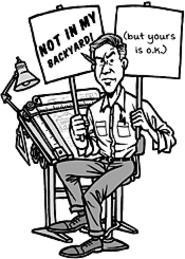"I've seen people come here, getting over a breakup," says 10-year resident Louise Foresman. "This might sound hokey, but it's a place of spiritual refuge."
Over on Cleveland's near west side, the residents of Herman Avenue possess a similar passion for their little piece of heaven, talking effusively about the green bluff by the lake, where an ancient spring runs underground.
More than sparkling blue views, however, these neighborhoods share the sense that their idyllic days are numbered: If plans for new development along the lake go through, a house or 12 could soon block their scenery.
But few of the aesthetically imperiled find themselves in as conflicted a situation as Christopher Diehl. A Cleveland architect, Diehl is a homeowner on Herman and a vocal opponent of development there. And in a tortured twist of logic and bad timing, he's also the architect designing the Beulah Park development across town.
Diehl and his wife, Holly Christensen, have ardently fought the Detroit Shoreway Development Corporation on every facet of the Herman Avenue project, which would go up on three acres of prime lake-viewing property that abuts their backyard. The couple wants no more than three houses on the land. They want the houses to take up no more than a half-acre total. And they want the remaining two and a half acres to eventually become a public park. They've spoken out at numerous neighborhood meetings and written letters pleading their case to Congressman Dennis Kucinich, among others.
Across town, however, Diehl has taken up the torch for lakefront developers: He's the lead architect on a plan to build 17 new homes on a three-acre meadow in Beulah Park, which would leave many existing residents without a lake view.
"I have a foot in both camps," he admits. "On one hand, I'm an angry neighbor, and if development is done, I want it done right. On the other hand, if neighbors at Beulah say, 'We don't want any development,' I say, 'Well, then, go find grant money and buy the land yourselves.'"
Plans for both developments were made possible by open green space that falls into the blurry area between public and private land. The land along Herman is considered "public surplus," meaning that it's owned by the city, but the city intends to sell it, foreseeing no public use for it. The Beulah land is private, but with restrictions, so the people who already live there can have some say in its future.
At a recent planning meeting, Diehl announced to Beulah residents that he empathized with them, because he was protesting a similar development in his own neighborhood. That disclosure went over like an open can of sardines. "He said he felt awkward," recalls baffled Beulah homeowner Cindy Barber. "I think he thinks he's just doing his job."
Diehl says he not only didn't think twice about taking the assignment -- which is a freelance gig done for close friend and developer Mike McBride -- he also believes the residents of Beulah are lucky to have him on the case and not some soulless T-square wrangler.
Since he's battling developers in his own 'hood, he feels their pain. "People are a little nostalgic and sad, and I understand that," he says. "When I sat in the neighborhood meeting for Beulah, and the developers and neighbors were very antagonistic, I played this unusual role as peacemaker."
Last spring, Diehl took his first stab at playing a modern-day Jimmy Carter in the Camp David Accords, when Beulah residents got word of their fate from an article in the Sun Scoop Journal. By that time, the ink had long since dried on Diehl's blueprints for the project, and the groundbreaking for construction was imminent. Everybody but the existing occupants, it seemed, had been informed that a herd of houses was about to pop up in the pasture out back.
Forced to scramble to have their voices heard, they were feeling plenty duped. "I told a few people that I'd read this," says Barber, "and we called the developer to say, 'What's going on here? Who's responsible for announcing this without having any community discussion?'"
Barber and other irked neighbors managed to get the groundbreaking delayed. Their big complaint is that 17 homes are too many to cram onto three acres. That number might ordinarily be OK, except that most existing homes in Beulah Park don't have backyards. The residents use the field as their communal backyard.
Take away the field, and you've got a recipe for Slum City -- nothing but a bunch of packed houses, says Barber, who doubts that families who spend $200K on a new home will be interested in sharing the proverbial armrest with their neighbor.
According to Diehl's plans for Beulah, a playground tucked inside the V of two roads would replace the field as shared green space. But that "calm, quiet place for kids to play Frisbee and have picnics in the park" is considerably smaller than the extra land he seeks for his own children to play in.
Beulah parent Leila Whitney doesn't want her 10-year-old son frolicking at any playground that's in the middle of an intersection. "You wonder how somebody can come up with ideas like this," she says, conjuring up visions of kids swinging on swings as cars rush by. "And then they can't understand when other people don't like it."
Diehl says that even he wishes that there could be more open space in Beulah Park. "I would prefer fewer homes, frankly. But you've got to build enough houses to pay for it."
Right now, both developments are stuck in planning-department purgatory, with projected construction dates pushed back several times. So there's still time for a little soul-searching by the sunset-dappled shore.














